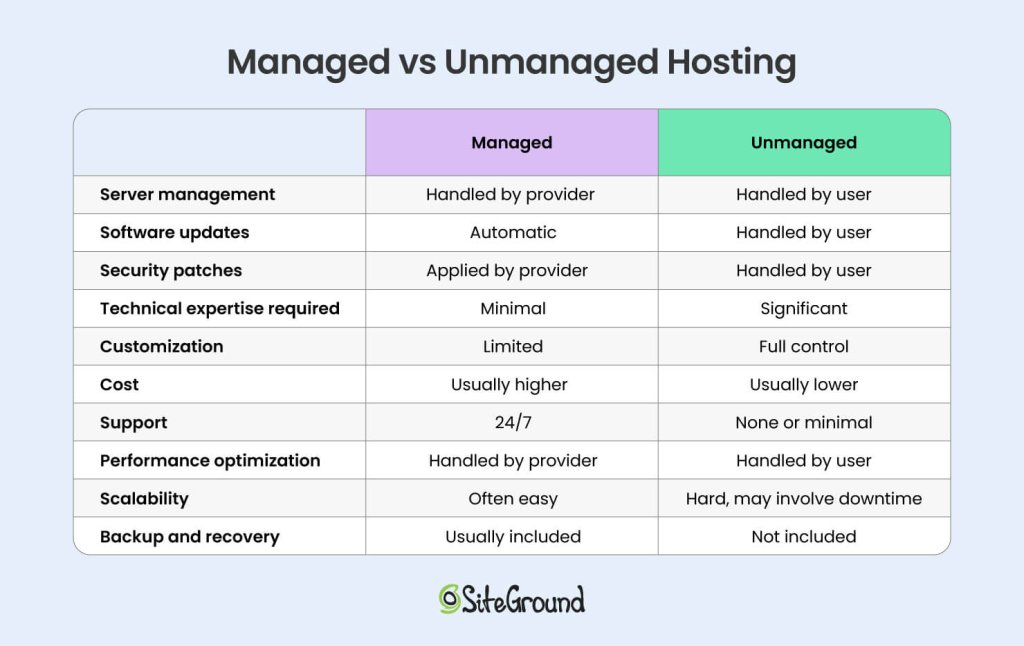Managed vs Unmanaged Hosting: Key Differences Explained

Choosing the right hosting service can make a big difference in your website performance and how much effort you need to invest in server management. So one of the most important decisions you’ll face when it comes to hosting is whether to choose a managed or an unmanaged solution. Both have their advantages—but which one fits your needs best?
In this guide, we’ll break down what each option offers, compare their key differences, and help you decide which server hosting type is right for you.
Key Takeaways
- Managed and unmanaged hosting are two distinct approaches to server management. They mainly differ in who handles the technical tasks.
- Managed hosting means your provider takes care of maintenance, security, updates, and expert support.
- Unmanaged hosting gives you full control, but also the responsibility to maintain a stable, secure hosting environment.
- Choose managed hosting if you want peace of mind and time savings; choose unmanaged if you need flexibility and have the technical skills.
What Is Managed Hosting?
Managed hosting is a type of web hosting service where the hosting company takes care of all the technical aspects for you. This includes server maintenance, security, operating system updates, backups, and more.
It’s a hands-off hosting solution ideal for users who don’t want to handle server management or lack the technical skills to do so. With managed hosting servers, your provider acts like your tech partner and ensures smooth operation and optimal performance.
This means:
- Initial server setup and ongoing maintenance
- Security monitoring and threat protection
- Automated software and operating system updates
- Regular backups and disaster recovery
- Performance optimization with dedicated resources
- Access to an experienced team for 24/7 customer support
It’s a great choice for business websites, blogs, and any WordPress site that needs reliable performance without technical headaches. Whether you’re launching a site solo or as part of a team, managed web hosting helps you focus on your content or business while a managed hosting team takes care of the backend.
What Is Unmanaged Hosting?
Unmanaged hosting gives you a bare-bones server with full control. You’re responsible for installing software, configuring the server, managing updates, and handling website security.
This type of hosting infrastructure is better suited for developers or experienced users who want customization and have the skills (or a team) to manage everything themselves.
It gives you full control over your server—but with that control comes responsibility.
You’ll need to handle:
- Server setup and configuration
- Software installation and updates
- Security hardening and firewall setup
- System patches and maintenance
- Troubleshooting, logs, and performance optimization
Unmanaged hosting plans can be flexible, but require more time, effort, and technical know-how. They’re often used when hosting a custom application, or when full root access is required for advanced configuration. Unlike a fully managed server, you’ll be entirely responsible for your own server resources and security protocols.
Differences Between Managed and Unmanaged Hosting
The biggest difference between managed and unmanaged hosting comes down to who handles the technical tasks.
| Feature | Managed Hosting | Unmanaged Hosting |
| Support | 24/7 expert customer support included | Minimal support; limited to hardware issues |
| Server Control | Limited; the managed hosting team handles setup and changes | Full root access and complete control |
| Security & Updates | Managed by the web hosting provider, including operating system updates and monitoring | Your responsibility |
| Performance | Optimized server performance with dedicated resources | You handle tuning and optimization manually |
| Cost | Higher; includes built-in services and expert management | Lower upfront, but may cost more in time and third-party tools |
| Ease of Use | Beginner-friendly, ideal for most website owners | Requires technical knowledge or a developer team |
With managed hosting services, the hosting provider takes care of everything behind the scenes—like updates, backups, and security. It’s designed to give you peace of mind and save time.

Unmanaged hosting, on the other hand, gives you complete freedom but also full responsibility. You’ll need to install and configure everything manually, keep the server secure, and monitor its performance.
Support is another major factor. Managed hosting clients typically benefit from having an experienced hosting IT team available 24/7. In contrast, unmanaged services usually offer limited support—mainly for physical server or network issues.
Pros and Cons
Both managed and unmanaged hosting have their strengths and weaknesses. Choosing the right one depends on your technical skills, available time, and what kind of experience you’re looking for.
Managed Hosting
The main benefit of managed hosting lies in what you don’t have to do. You won’t need to configure the server, monitor performance, or worry about backups and updates. That peace of mind is worth the higher price for many site owners, especially those focused on content, and business operations.
The trade-off? Less flexibility and a reliance on your hosting provider to make system-level changes on your behalf.
Unmanaged Hosting
Unmanaged hosting gives you complete control—ideal if your project demands a specific tech stack or setup.
You’ll need time, skills, and a solid understanding of server administration. It can be cost-efficient, but the hidden cost is the expertise it demands.
If you’re building something custom, or have an internal team ready to manage a server environment, this route offers maximum freedom—at the price of greater complexity.
How to Choose: Managed vs. Unmanaged Hosting
The right option depends on your goals, technical ability, and how hands-on you want to be.

1. Cost
Managed hosting plans usually cost more, but they include expert support, backups, optimizations, and peace of mind. For most website owners, the investment in fully managed hosting is worthwhile for the convenience and time savings.
Looking for a hosting provider that takes care of performance, security, and support?
SiteGround’s managed hosting includes built-in caching, a custom CDN, daily backups, and expert support—so you can focus on growing your site.
If budget is your primary concern and you have the skills to manage a server, unmanaged hosting may work—especially if you’re setting up a custom project or testing new environments.
2. Technical Expertise
Server maintenance and performance tuning can be overwhelming if you’re not technically skilled. Keeping up with patches, configuration changes, and server resources requires knowledge and constant attention.
That’s why managed cloud hosting or a fully managed shared server is the best option for most users. With managed hosting solutions, you get a professional team that handles everything for you—so your focus stays on growing your site or business.
3. Custom Requirements
Some custom-built applications may have specific software requirements that are not available on managed setups. In such cases, unmanaged hosting offers the flexibility you need—at the cost of doing everything yourself.
However, if you’re hosting a WordPress site, an online store, or a business site, most managed hosting providers already offer optimized environments.
Even if you have custom requirements, managed services may still be the better option. Managed dedicated hosting clients, for example, benefit from having the entire physical server managed and configured for them.
Managed or Unmanaged Hosting—Which Option Is Best for You?
To summarize, if you want a worry-free experience and prefer to focus on your business—not server configuration—managed hosting services are the way to go. It’s perfect for business owners, bloggers, and non-technical users who want their site to just work.
On the other hand, if you’re experienced, enjoy customizing your tech stack, and need total control, unmanaged hosting gives you that freedom. It’s best suited for developers, sysadmins, or those with the time and knowledge to manage a server hosting environment on their own.
At the end of the day, choosing the right hosting service is about balancing cost, control, and convenience.
For most website owners, managed hosting is the smarter, stress-free choice. You get expert support, built-in security, and top performance—without the technical headaches. If you want a reliable solution that just works, try managed hosting with SiteGround and grow your website!



Comments ( 0 )
Thanks! Your comment will be held for moderation and will be shortly published, if it is related to this blog article. Comments for support inquiries or issues will not be published, if you have such please report it through our official channels of communication.
Leave a comment
Thanks! Your comment will be held for moderation and will be shortly published, if it is related to this blog article. Comments for support inquiries or issues will not be published, if you have such please report it through our official channels of communication.